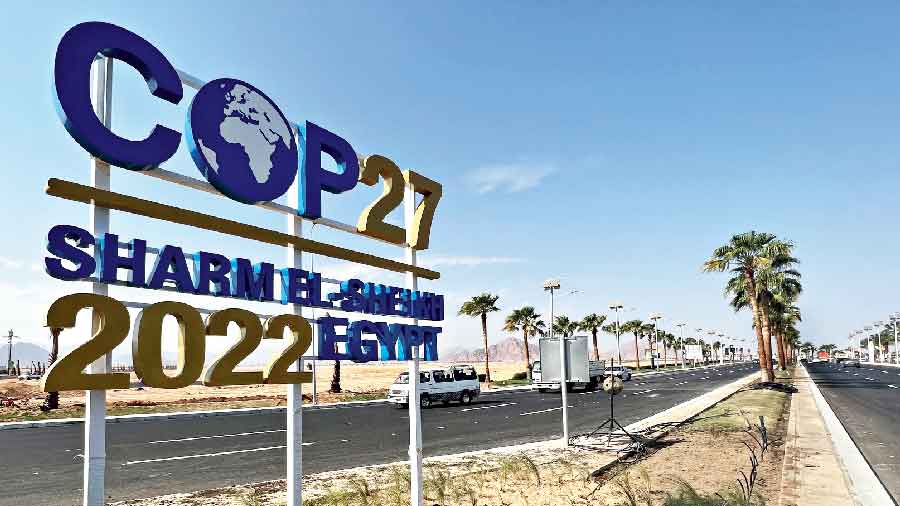Two events highlight global cooperation this month. The need for this exceeds the conspicuous lack of it in today’s world. Multiple shocks have impacted the world economy, the unprecedented ones being the Covid-19 pandemic, the Russia-Ukraine war catapulting geopolitics above geoeconomics, and weather extremities. Frayed relations between the United States of America and China have aggravated the problems. The combined fallout on global supplies and prices, especially food and energy, has slowed recoveries, with some big economies expected to slide into recession. Policy challenges to tackle inflation, facilitate urgent climate actions, and recover global growth provide the backdrop to the 27th annual Conference of Parties on climate change issues that commenced last week as well as the G20 leaders’ summit — a group of twenty advanced and emerging economies formed to coordinate policies for global economic stability and sustainable growth, amongst other objectives. The problems are universal and testing, but require mutual collaboration. Can this happen?
Standalone actions cannot address climate change, which recognises no geography or jurisdiction — global warming caused by greenhouse gas emissions affects all, albeit unequally. Realising the shared objective of limiting global temperature to 1.5 degrees Celsius above pre-industrial levels is a joint responsibility. Climate negotiations are fractious, ranging from rules and regulations to financing, investments, technology and so on. They’ve been tortuously slow, riven by a rift amongst the rich countries — responsible for global warming through their greenhouse gas emissions for over a century — and the developing ones, which bear the brunt of climate-related vulnerabilities and bear grudges against injustices in the decarbonisation efforts that could slow their growth rates. The demand is that the richer countries pay to cover the costs of climate damages and for low-carbon transition — a moral obligation. The pledge of climate financing of $100 billion annually to ensure a just transition to a clean energy future remains unfulfilled so far; the figure is peanuts compared to an estimated $1 trillion required for climate actions each year.
However, there are some positive markers of climate cooperation. The inclusion of climate ‘Loss and Damage’ compensation in COP27’s official agenda for the first time; funds for some highly vulnerable countries by a few rich nations towards adaptation financing; a carbon offset plan — the ‘Energy Transition Accelerator’, a US government initiative with the Bezos Earth Fund and the Rockefeller Foundation to enable developing countries to meet their energy-transition goals through private capital, are some examples. The prospect of these extending to satisfactory aid for developing countries or any meaningful green initiatives is still uncertain. Stretched public finances and astronomical debt levels in the advanced world are key restraints. Financial positions of the poorer countries are far more precarious. Many are reeling under weather severities, which have added to the pandemic distress, including hunger and increased poverty; most face depressed growth and narrowed funding opportunities or access.
There are positive ironies too. The cumulative impetus of different shocks has been unintendedly motivational for climate cooperation. The once-ina-century pandemic underscored the reality of climate change, shook past apathies, and elicited net-zero emission pledges by many countries, most notably by the two largest emitters, the US and China. Second, Russia’s weaponisation of gas supplies created forceful incentives for structural change in energy markets and policies; according to the International Energy Agency, despite an increased use of fossil fuels to bridge shortfalls, it has accelerated transitions to renewable energies and cleaner technologies (The Economist, November 5, 2022). Third, geopolitical and extreme weather shocks further underlined climate change threats to food security as deficits arose due to heatwaves and weather-and war-induced disruptions to foodgrain trade and transportation; earlier, the pandemic had reinforced securing essential foods and nearshoring production of medical and other necessities.
A meeting of the American and Chinese presidents on the sidelines of the G20 meeting this week is a positive development in this light. Both countries are critical to advancing climate cooperation. This applies as much to other global challenges at the G20, which is more impeded by geopolitics than any other group. A platform for multilateral cooperation, conceived such that leaders of member countries could meet unconstrained by the formal structures that exist at other multilateral forums, the body played an important role back in 2009 — the joint, coordinated policy responses helped avert a recession and restored the functioning of financial markets. But the world and its environment in 2022 do not empower the G20 to make a difference of comparable scale or magnitude. Heightened US-China tensions have additionally weighed down its functioning. The G20 has economic heft, constituting almost 80% of the world’s GDP and three-quarters of its trade, besides significant financial and investment flows. Therefore, how its members, especially the big ones like the US and China, respond and perform would make a substantial difference to the world economy. This is why the leaders’ meeting of these two countries at the first G20 summit since the outbreak of the war represents some ice-melting, if not a breakthrough.
Coordinated, collective efforts for mitigating inflation, ensuring food security for vulnerable populations, and combating the global economic slowdown are sorely needed in these difficult times. Individual and differential responses to problems such as inflation when the causes are common (for example, energy prices, war-related sanctions and blockages to trade) end up aggravating the problems rather than resolving them. Similarly, an optimal restoration of world trade would facilitate lower costs, stimulate growth and investments but it seems doubtable. Economic and trade fragmentation with concepts such as ‘friend-shoring’ production and reshaping supply chains, governed by security, friendship, and shared values instead of efficiency considerations, serve to undermine the G20’s capacity or capability for agreements on vital issues.
Still, the platform provides a valuable, informal space and an opportunity to lessen tensions and heighten political reconciliations. Even a semblance of this would help inch closer to addressing critical and common global challenges. Climate mitigation, overlapping with COP27, is one of these, while the other imminent issues require multilateral economic cooperation for which the G20 is an important forum. However, meaningful breakthrough or progress in the current settings remains an open question.
Renu Kohli is a macroeconomist










